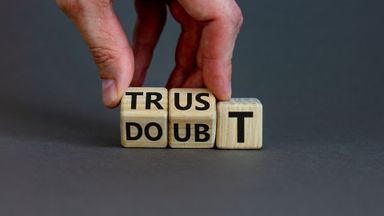Recent happenings in the world
It’s been interesting (depressing) to see how a superpower nation we used to trust now makes it impossible to trust them. Lying, betraying and exploiting have that effect. Maybe trust is also out of fashion?
A few reflections
Many years ago I started hanging out with a person from a country and culture far away. After he had done some work in Sweden he said that we had a very high level of trust and how wonderful that is. I totally didn’t understand what he meant. After all, I had lived and worked in the same rural part of Sweden my whole life. I didn’t realise how lucky I was and how good that situation was for the outcome and impact of collaborations, short and long term.
Now many years later I have operated in environments of low trust and now I better understand what my friend meant. In an environment of low trust everything is slow, frictional and hard. Lots of suspicion, low psychological safety and derogatory thoughts crop up. It’s the opposite of a collaboration-friendly situation, and a setup for conflict.
“Who needs trust? Just set up a very detailed contract.” I couldn’t disagree more, trust is sooo much more valuable for collaboration than contracts. In situations of high trust, a contract is not really needed. In low trust, a contract won’t help. I know that contracts are for later on if something goes wrong, and not for early on when everybody is hopeful. But going back to where I started, with the superpower nation going rogue. For contracts to possibly help at all, there must be the rule of law and that too seems to be in limbo for the superpower nation…
In situations of high trust, a contract is not really needed. In low trust, a contract won’t help.
To put that in a professional perspective, let me take one more reflection. A CIO at a large company was repeatedly disappointed with the vendors of their strategic initiatives. He asked me how to pick a vendor to avoid that. I was caught off guard and said “pick the one you trust the most”. He replied that this was the opposite of what they were doing. Their contracts were getting thicker and thicker and they talked to their vendors with louder and louder voices. It didn’t seem to help, it just got worse.
Explanation models
My initial thoughts about why I was so familiar with high trust environments was about small-scale communities where “everybody knew everybody”. But a problem with that explanation is that trust was in place from the start no matter if you knew the other person or not. Kind of like the opposite of the old saying that trust must be earned. Trust was rather the default. How come?
Fortunately, I’m lucky to hang out with people who challenge me all the time and a colleague suggested Hofstede's cultural dimensions theory as a possible explanation model. One of the six key dimensions for comparing national cultures is called the Power Distance Index (PDI). It describes the degree to which authority is accepted and followed. As I understand it, my habitat has a very low PDI which seems to lead to “early high trust” in many situations. I realise how internalised a low PDI is for me, I cringe when I read about the opposite. :) I will learn more about this. It’s super interesting! Also, as you know, there is a risk of oversimplification with such models. All models are wrong, but some are useful.
Another explanation is alignment on values. If you don’t align on values, you can still hang out and learn new perspectives from each other, but collaboration can probably be expected to suffer. That makes sense, but the problem is how to know that you align on values. Even though you can exchange information about values, that’s at best an indication. To know, you probably need to work together, to see the values in action. It might not be clear by just talking, that one person doesn’t see lying as a problem if it helps, while another person would rather fail than lie.
Oh, and aligning on values doesn’t mean that you only hang out with yes-sayers. At least our values (at factor10) means the opposite, for example that everybody has a responsibility to care for their colleagues and therefore challenge them when they see a better way.
If the trust is gone?
You can’t force anybody to be worthy of your trust or to trust you. It might be sad, but you don’t have to continue working tightly together forever when the trust decreases, for example because of a misalignment in values. If that happens, you use the protection needed while you fulfil your commitments. This might be a very stable setup, a setup which is worthwhile for all involved and thereby also long term.
If the trust is gone at some point, you might end the relationship. You just change and collaborate with someone else, with whom your values align. That’s in the best interest of all parties. It’s as easy as that.
Finally
The more I think about trust, the more dimensions and aspects crop to mind. I will dive into that in another text. I hope you have time to share some thoughts also!
I started with a question whether trust is out of fashion. For me it’s a no.
This article was originally published on LinkedIn. Join the discussion and read more here.
